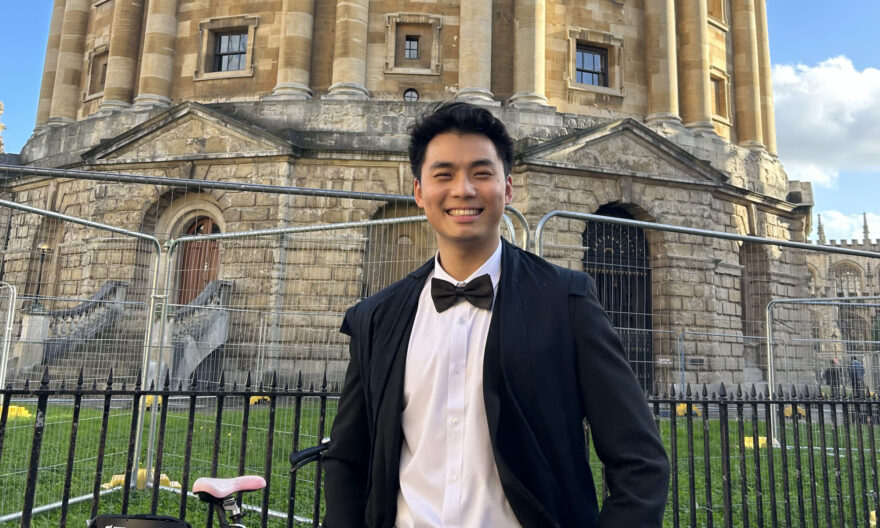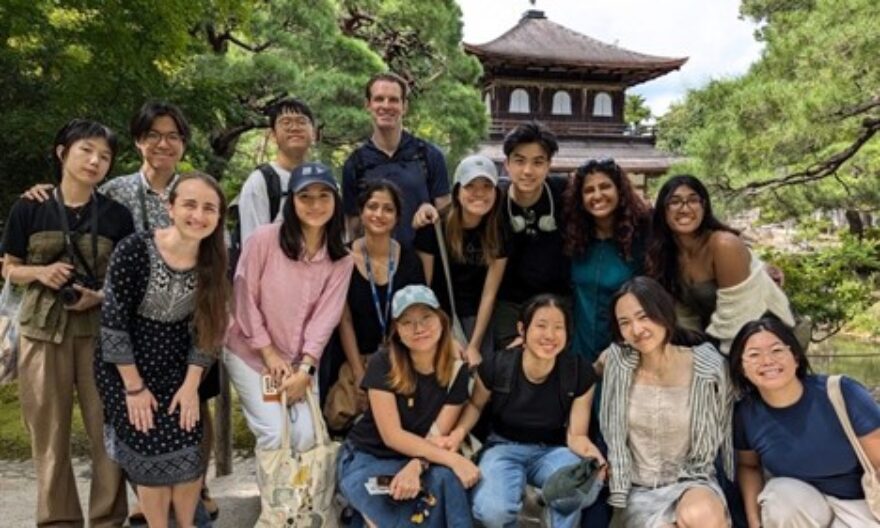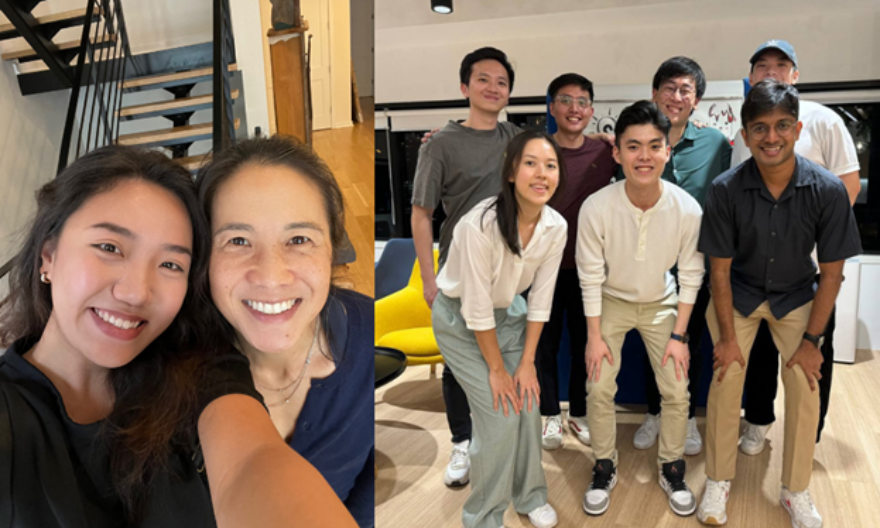Students embark on a diverse range of faculty-led or student-initiated research projects during the summer
Every summer, Yale-NUS College students are offered the opportunity to pursue learning beyond the confines of the curriculum textbooks. In line with the College’s ethos of encouraging rigorous and global learning, the Yale-NUS Summer Research Programme (SRP) enables Yale-NUS students to pursue funded research projects, whether it may be student-initiated or faculty-led, in Singapore or overseas.
After spending a semester abroad at Yale University, Goh Rui Zhe (Class of 2020) remained there over the summer to work on multiple projects with Yale Professor of Psychology Brian Scholl. One of the projects is titled “The speed of animacy: How quickly we detect life in a face” and it looked at how much time people need to see ‘life’ and ‘mind’ in a face.
Explaining the project, Rui Zhe said that experiment participants rated the presence of life in doll faces, real faces and faces that were a combination of both. They found that observers gave consistent ratings of the presence of life as long as they saw the face for 250ms, or a split-second. According to Rui Zhe, it is the ‘life’ and ‘mind’ in a face that have far-reaching consequences pertinent to the study of moral cognition and social behaviour.
Rui Zhe plans to enrol in a cognitive science graduate school after graduating from Yale-NUS College.
“This research project has taught me the important skill of designing good experiments. My supervisors would give candid feedback on my experimental designs and point out flaws that I never thought of. This intensive training has not only solidified my scientific skills and knowledge, but also enriched me with important connections that will be of value in my graduate school application,” said Rui Zhe.
Back in Singapore, Viktoriia Zlomanova and Pearlyn Low (both from the Class of 2021) conducted a History research project on “Cold War Singapore and the Eastern Bloc”, a faculty-led project by Assistant Professor of Humanities (History) Mate Rigo. The project focused on Singapore’s role as one of the key sites of Cold War spying and information gathering between the United States, China and the Eastern Bloc from the 1960s to early 1980s.
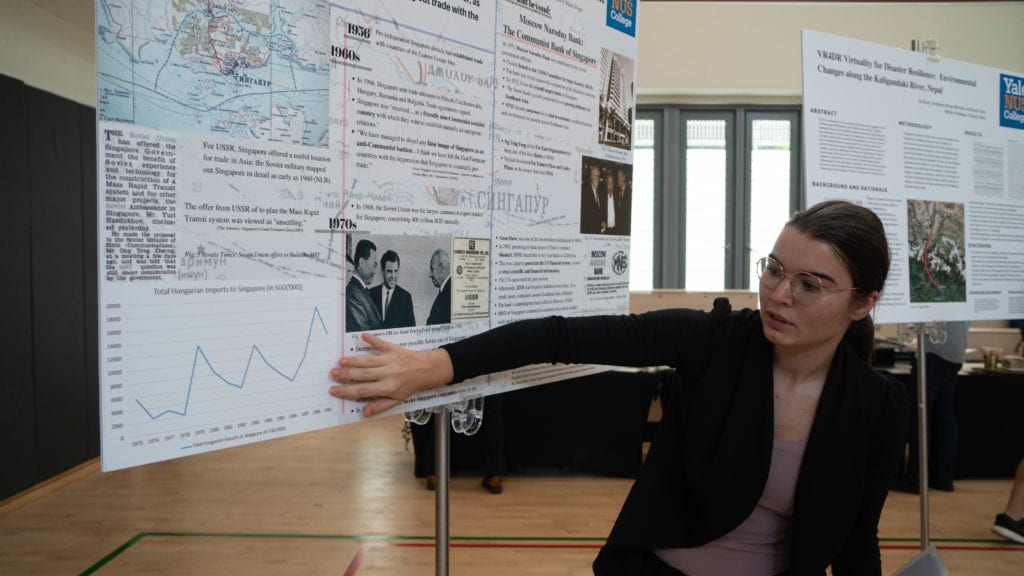 Viktoriia presenting her research at the Yale-NUS Summer Research Symposium held on 4 September 2019. Image by Charmaine Chua for Yale-NUS College.
Viktoriia presenting her research at the Yale-NUS Summer Research Symposium held on 4 September 2019. Image by Charmaine Chua for Yale-NUS College.
In the course of excavating archival Singapore-Soviet Union information, Viktoriia stumbled across the curious entity of the Moscow Narodny Bank, a Soviet bank that operated in Singapore during this period.
“This is a piece of history that was unknown to us until then and I spent the rest of the project trying to reconstruct the history of the bank from news articles and archival documents. I realised that the bank was closely related to the KGB, the main security agency of the Soviet Union. Based off a wide range of evidence, I am convinced that the bank played a pivotal role in Soviet geopolitical interests in Southeast Asia,” said Viktoriia.
As someone of Russian nationality who had lived in the US for a considerable amount of time, Viktoriia jumped at the opportunity to conduct research on the Cold War. However, she elaborated that what really drew her to the project was the relevance it had to Singapore, the country she now calls home. This project has since helped her better explore and establish deeper connections with Singapore by increasing her understanding of Singapore’s place in history.
“My greatest learning outcome is confidence. Researching something so big as the Cold War has taught me the virtue of patience and strategy. There are days where I dug through the archives of three countries and gave up halfway through the day to have chicken rice. But there are also days where everything falls into place and I feel incredibly rewarded,” she mused.
For sisters Heng Jia Min (Class of 2020) and Heng Jie Min (Class of 2022), they decided to conduct a field study research project at Pulau Ubin, Singapore, alongside fellow student Sohaib Nashit (Class of 2021) and under the guidance of Assistant Professor of Science (Environmental Studies) Michiel van Breugel.
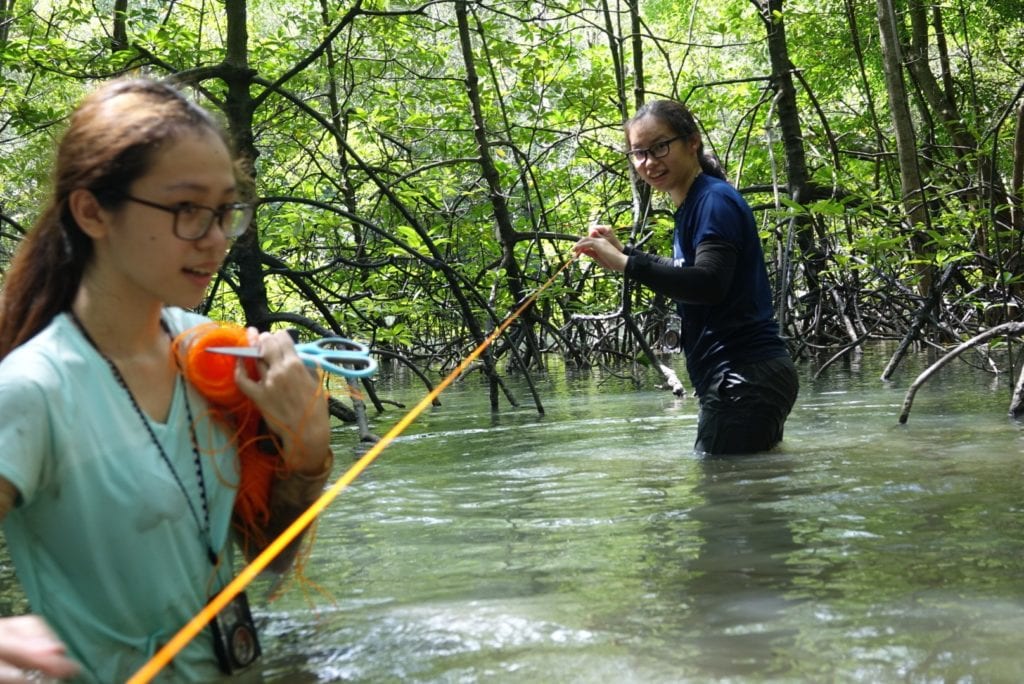 Jia Min and Jie Min doing field research at Pulau Ubin, Singapore. Image provided by Heng Jia Min.
Jia Min and Jie Min doing field research at Pulau Ubin, Singapore. Image provided by Heng Jia Min.
Titled “Response of Plant Functional Traits and Plant Ecophysiology to Water Availability in Singapore’s Mangrove and Swamp Forest Habitats”, the project aimed to find out whether light availability is a limiting factor for mangrove seedling establishment. This is a relatively understudied research area, with the potential to inform mangrove restoration efforts.
Jia Min has been involved in ecological field work multiple times during her time at Yale-NUS. However, she jumped at this particular opportunity because it allowed her to conduct field work in the mangrove swamps independently and without the benefit of having professors on-site to help her troubleshoot. “I was excited to experience the ups and downs of working in an ecosystem foreign to me and setting up a study, and learn more about my style of leadership and project management”.
Echoing her sister’s thoughts, Jie Min, a prospective Environmental Studies major, explained that a research project like this allowed her to further explore her interest in ecology and environmental science.
“Besides gaining first-hand experience of how ecological fieldwork is carried out, I also picked up skills needed in data management and logistical planning, along with some botanical knowledge of the different mangrove species,” she elaborated.
With these new skills under her belt, Jie Min plans to continue working on ecological research work as a student associate to Asst Prof van Breugel and Laboratory Manager Dr Taylor Sloey during the semester. She added that after visiting the Herbarium in the Lee Kong Chian Natural History Museum over the summer, she also thoroughly enjoyed learning plant identification and would like to volunteer or intern at a natural history museum in the future.
As a follow up to the research projects undertaken over the past summer, students presented their projects at the annual Summer Research Symposium held on 4 September to share their knowledge with the Yale-NUS Community. Watch the video below to see highlights from the Symposium.

